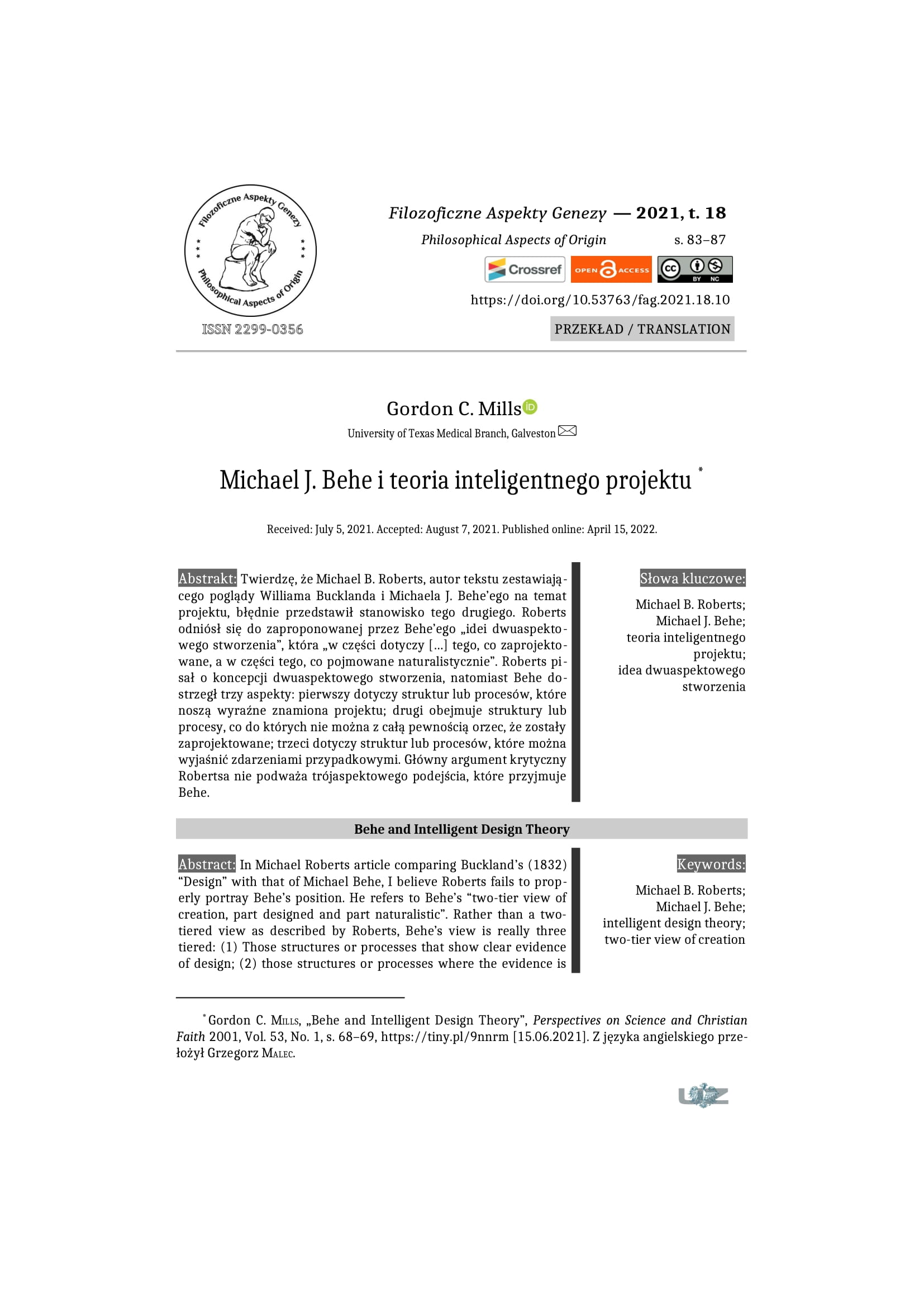
Opublikowane 15.04.2022
Słowa kluczowe
- Michael B. Roberts,
- Michael J. Behe,
- teoria inteligentnego projektu,
- idea dwuaspektowego stworzenia
Prawa autorskie (c) 2022 Filozoficzne Aspekty Genezy

Utwór dostępny jest na licencji Creative Commons Uznanie autorstwa – Użycie niekomercyjne 4.0 Międzynarodowe.
Jak cytować
Abstrakt
Twierdzę, że Michael B. Roberts, autor tekstu zestawiającego poglądy Williama Bucklanda i Michaela J. Behe’ego na temat
projektu, błędnie przedstawił stanowisko tego drugiego. Roberts odniósł się do zaproponowanej przez Behe’ego „idei dwuaspektowego stworzenia”, która „w części dotyczy […] tego, co zaprojektowane, a w części tego, co pojmowane naturalistycznie”. Roberts pisał o koncepcji dwuaspektowego stworzenia, natomiast Behe dostrzegł trzy aspekty: pierwszy dotyczy struktur lub procesów, które noszą wyraźne znamiona projektu; drugi obejmuje struktury lub procesy, co do których nie można z całą pewnością orzec, że zostały zaprojektowane; trzeci dotyczy struktur lub procesów, które można wyjaśnić zdarzeniami przypadkowymi. Główny argument krytyczny Robertsa nie podważa trójaspektowego podejścia, które przyjmuje Behe.
Downloads
Bibliografia
- Behe Michael J., Czarna skrzynka Darwina. Biochemiczne wyzwanie dla ewolucjonizmu, przeł. Dariusz Sagan, Seria Inteligentny Projekt, Fundacja En Arche, Warszawa 2020.
- Behe Michael J., Experimental Support for Regarding Functional Classes of Proteins to be Highly Isolated from Each Other, w: Buell and Hearn (eds.), Darwinism: Science or Philosophy…, s. 60–71.
- Buckland William, Geology and Mineralogy Considered with Reference to Natural Theology. Treatise VI, Vol. I–II, William Pickering, London 1836. DOI: https://doi.org/10.5962/bhl.title.125523
- Buell John and Hearn Virginia (eds.), Darwinism: Science or Philosophy? Proceedings of a Symposium Entitled Darwinism: Scientific Inference or Philosophical Preference?, Foundation for Thought and Ethics, Richardson 1994.
- Corey Michael A., Back to Darwin: The Scientific Case for Deistic Evolution, University Press of America, Lanham 1994.
- Mills Gordon C., A Theory of Theistic Evolution as an Alternative to the Naturalistic Theory, Perspectives on Science and Christian Faith 1995, Vol. 47, No. 2, s. 112–122, https://tiny.pl/9nnrv [15.06.2021].
- Mills Gordon C., Similarities and Differences in Mitochondrial Genomes: Theistic Interpretations, Perspectives on Science and Christian Faith 1998, Vol. 50, No. 4, s. 286–291, https://tiny.pl/9nnr6 [15.06.2021].
- Roberts Michael B., Zaprojektowany do drapania? Zestawienie poglądów Williama Bucklanda (1832) i Michaela J. Behe’ego na temat projektu, przeł. Grzegorz Malec, Filozoficzne Aspekty Genezy 2021, t. 18, s. 51–81, https://doi.org/10.53763/fag.2021.18.7. DOI: https://doi.org/10.53763/fag.2021.18.7
- Van Till Howard J. and Johnson Phillip E., God and Evolution: An Exchange, First Things 1993, June/July, s. 32–41.


